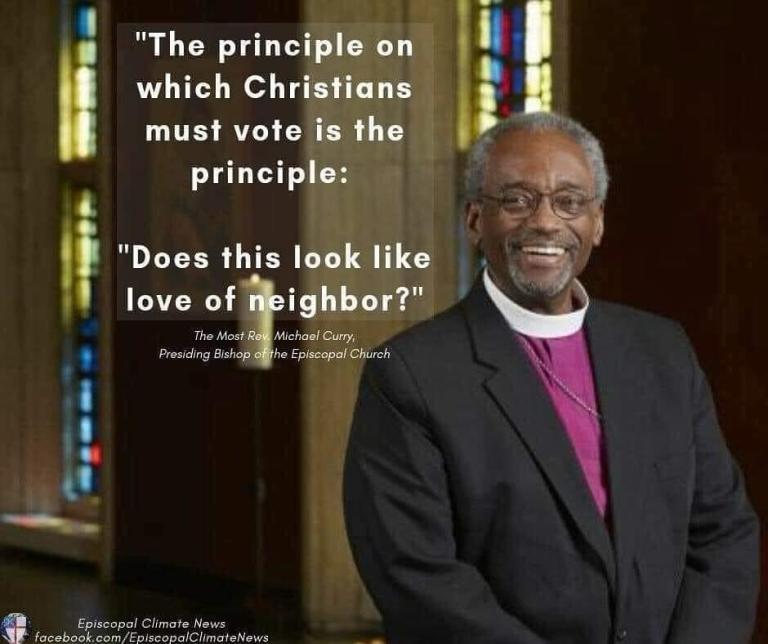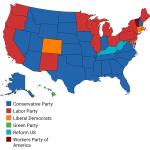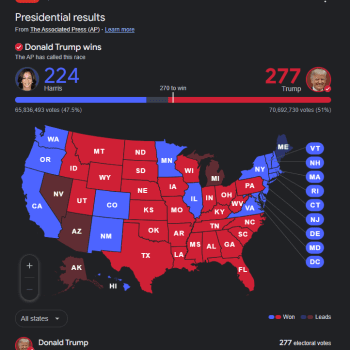Vote for the party of biblical values!
Have you been told that? I was recently (and not for the first time) by someone who was clearly aligned completely with the Republican party. The individual also claims to be a Christian. When I pushed back on their stance, they assumed that I’m a Democrat.
The starting point for any discussion of U.S. politics as it relates to faith ought to be that no major party is likely to completely represent biblical values. If they did, it would be a miracle.
If we had more parties than just two, then of course we could have a party that advocated for certain religiously-inspired teaching. They would most likely not win elections.
Above all else, one thing needs to be clear: “Biblical values” is a slogan that does not have unambiguous contents. The Bible includes xenophobic and inclusive voices. There is room for retaliation but also teaching against it. There is a valuing of human life coupled with concern for social and economic justice.
When a party, and or their advocates in religious communities, claims that they are “the party of biblical values,” they are not offering a statement of fact. They are offering an advertising slogan.
If you are a critical consumer, you hopefully know that advertising claims need to be evaluated and not simply accepted.
If your faith is important to you then you should treat it more seriously than you do your choices of laundry detergent or grocery store. Don’t just accept what you are told.
The Bible warns about false teachers but we always assume those are the ones other people listen to, not us. When we are presented with evidence that we have been duped, our sinful arrogance kicks in and our reaction is to double down. For that reason, I offered some counterevidence to my friend and then bowed out of the conversation to let the seeds from the Bible that I had planted do their work.
My friend told me to just pray for wisdom and I’d know whom to vote for (hint hint wink wink nudge nudge). I responded that neither US party comes particularly close to the Bible’s emphasis on justice. The Jubilee year had debts cancelled and property returned to its original owners once a generation, to prevent people either accumulating excesses of wealth or falling into an ongoing cycle of poverty. Sometimes one party does line up a bit more closely than another. For instance, does either party do a better job of applying this biblical law in our own context?
“‘When a foreigner resides among you in your land, do not mistreat them. The foreigner residing among you must be treated as your native-born. Love them as yourself, for you were foreigners in Egypt. I am the Lord your God.” (Leviticus 19:33-34)
My friend seems to imagine that a party whose policies favor the wealthy and whose rhetoric is increasingly xenophobic comes closer to biblical principles. What that shows me is how easy it is to manipulate voters who haven’t read the Bible and yet believe it to be authoritative even so. Just claim to be biblical while doing the opposite of what the Bible teaches and see how they follow you. It is sad and shameful, and brings the gospel into disrepute.
They say that if God’s values always align with yours, you have an idol made in your image. I’d add that if you have a party that aligns with your religious values completely then that political stance has replaced your religion.
Neither U. S. party represents my values completely. I will vote nonetheless because, unlike the early Christians or ancient Israelites, I have a say in who represents me. Indeed, the privilege of democracy is that we elect representatives rather than being ruled over by those who are strong enough to seize and hold onto power.
I wonder whether some Christians might not think that strong political leadership looks like an ancient king because those were the leaders of the nation in the stories in the Bible. Because the Bible offers no depiction of Jesus or one of his followers “in command,” many Christians fail to try to envisage what Christian leadership is supposed to look like.
Jesus called them together and said, “You know that the rulers of the Gentiles lord it over them, and their high officials exercise authority over them. 26 Not so with you. Instead, whoever wants to become great among you must be your servant, and whoever wants to be first must be your slave— just as the Son of Man did not come to be served, but to serve, and to give his life as a ransom for many.”(Matthew 20:25-28)
Vote your values, or better still, vote the values of Jesus. Do it recognizing that neither party fully reflects the concern for the poor and downtrodden, the oppressed and marginalized, that predominates in biblical literature. Vote knowing that it is not enough to vote. You also need to stand up and advocate for justice, beyond what either of the two choices you are offered will do. Be an engaged American citizen, but also be a Christian. Work to have government and economy reflect our concern for the least of these, but recognize that precisely because we do not have a party that fully reflects our values, our work is not done when we exit the voting box.
I’ll end with a meme that I saw that summarizes a lot of this in far fewer words. It features Episcopal Presiding Bishop Michael Curry.


















